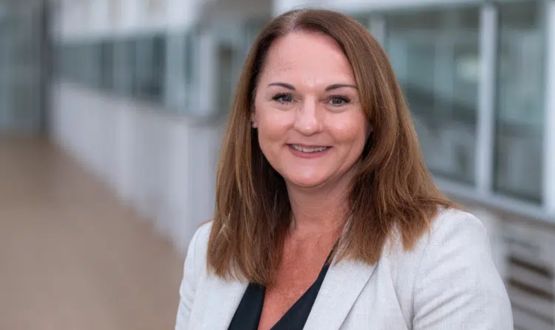Helen Thomas: ‘Are our systems ready for the next pandemic? No.’

As chief executive officer of Digital Health and Care Wales (DHCW), Helen Thomas is leading a six-year digital strategy that aims to empower people to live healthier lives.
This mission involves enabling people in Wales to access and use their own health information and interact more easily with health services. But it also necessitates connecting data and simplifying an overly complex digital landscape.
Another concern for Thomas is that restrictions on the sharing of data – temporarily relaxed during the Covid pandemic response – have returned and pose a potential barrier to progress.
Ahead of speaking at Digital Health Rewired 2025, she tells Digital Health News why it is time to stop compromising on integration and move towards a more “streamlined, standard approach”.
DHCW’s six-year strategy set out a mission to create a single national clinical data repository by 2030. Why is this so important – and how are you addressing the barriers that stand in the way?
The reason that this is a strategic objective is [that it will give us] the ability to deliver the patient-centred record so that we can be ‘organisation agnostic’.
Wherever a patient presents in Wales, we will have all the care information in one national place so you can make that available where it needs to be available. It also gives you the opportunity to join clinical data together so that you can really add value to the optimisation of pathway management.
Some of the challenges are around the capability to share. The interoperability standard space needs a huge focus, not just from the NHS digital health leads but also from our partners in the vendor community in terms of their ability to comply.
We’ve had an open architecture approach in Wales for many years, but this is really moving on at pace.
It sounds like an oxymoron, but we have ‘non-standard standards’; there have been compromises to makes things work in an integrated way over the last two decades.
The compromises have been helpful but what you end up with is a complex integration network, whereas what you need to aim for is a clean, streamlined, standard approach.
Locally there are challenges in terms of professional development – it’s a highly competitive market. We’re doing some work around the professional development of the workforce that will standardise the rules, job descriptions and bandings.
This allows us to do strategic workforce planning in an informed way, so we can target the skills that we need to attract, retain and develop. We want to make sure that spreads right across digital professionals in Wales.
Sir Frank Atherton, chief medical officer for Wales, told the UK Covid-19 Inquiry in September 2024 that systems struggled to set up a rapid shielding programme for vulnerable people. Are you confident that IT systems in Wales are now prepared to meet the next pandemic?
We made a huge leap forward and learnt a lot [during the pandemic]. Are we ready for the next one? No.
Some of the issues are less to do with connectivity and more about understanding – and how you identify what you need to identify.
The use of data is imperative to an effective health and care system, yet we’ve almost snapped back to pre-Covid
Sometimes when you listen to the Covid [inquiry] evidence, it is so detached from the experience you had at the time, because you didn’t know who were ‘the vulnerable’. The evidence was changing daily.
The use of data is imperative to an effective health and care system, yet we’ve almost snapped back to pre-Covid.
Some of the opportunities we had in Covid only presented because we were in the response to a public health emergency; there was a relaxation of the common law on duty of confidentiality. That doesn’t happen in normal times, and we haven’t moved forward. We don’t now have the legal cover to pull data together in the way that was allowed at the time.
There is work to do here around national strategies across the UK. We need to have an informed conversation with the public so that you’ve got buy-in.
We would be better prepared in the sense that we would know how to mobilise, who to mobilise, and where to target our resources to the best effect.
How much progress has been achieved in introducing an electronic prescription service to Wales?
About 7% of GP practices have switched on EPS, and 19% of community pharmacies. By the end of March, the remaining three of our seven community pharmacy suppliers will have undertaken accreditation with NHS England and all of them will be ready to adopt EPS.
There is a complicating factor – we have two GP system suppliers at the moment, EMIS and In Practice, which has just gone into administration. We had already an ambitious migration programme [to EMIS], that will now be worked through as quickly as possible.
EPS is a game changer. The benefits will be tangible for patients. The control and visibility it gives you is fantastic for patients and for GPs. You will also have more automated data that you can draw insights from.
Wales has struggled with long waiting lists, with some patients waiting more than a year or two years. Can digital solutions make a significant difference to this challenge?
One in four people are on a waiting list in Wales. If you look at the demographic of Wales, the impact of the pandemic will be proportionately higher because we are older and sicker than the population over the border. Our legacy, in terms of our industrial heritage, is driving some of that.
The digital opportunity is absolutely huge. There’s an opportunity for more targeted advice, based on understanding more about an individual’s care and condition. There’s a huge amount to do around empowerment and patients interacting with the health service in a digital way.
There are also the wider efficiency gains if you’ve got pathway management being transparent and visible across all elements. There are a lot of opportunities for process improvement and process re-engineering to support optimum pathways and deliver the best outcomes.
Can you give us a taster of what you’ll be talking about at Rewired 2025?
I want to be clear about the strategic direction in Wales – where we’ve got key challenges and where they can be turned into opportunities. Partnership working will be a key message for me.
Thomas will be speaking at Rewired 2025 at the NEC in Birmingham, 18-19 March 2025. Register here. The event is co-headline sponsored by The Access Group and Microsoft. Alcidion, Nervecentre, Solventum and Cynerio are also sponsors.



